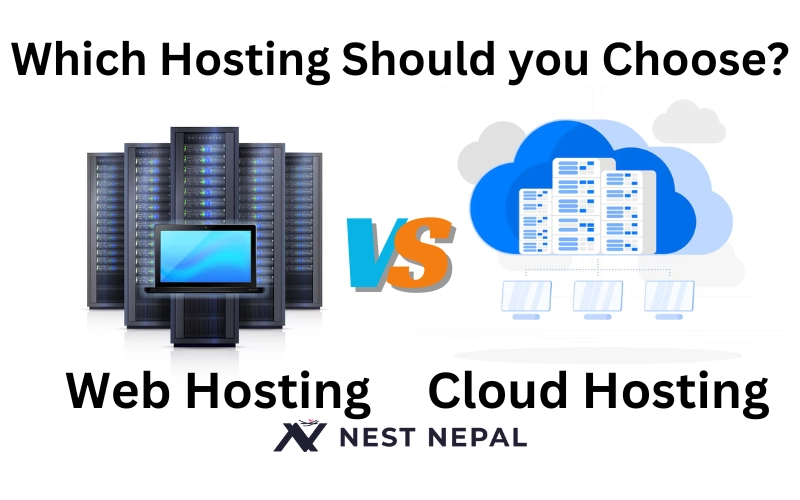In the world of websites and online businesses, web hosting vs cloud hosting are like two different ways of renting space to store your stuff. Imagine web hosting as renting a room in an apartment building. You have your own space, but you share things like the building’s utilities with other tenants. It’s great for small projects or personal websites because it’s simple and doesn’t cost too much.
Now, picture cloud hosting as having your own house with magical expanding rooms. You can make your house bigger or smaller whenever you need to, depending on how many guests you’re expecting. Cloud hosting is like that – it’s super flexible and can handle lots of visitors to your website without slowing down. Plus, you only pay for the space you use, so it’s great for businesses that grow and shrink a lot.
Deciding between web hosting and cloud hosting is like choosing between renting an apartment or a house. It depends on how much space you need, how many visitors you expect, and how much you’re willing to spend. In the end, both options have their perks, and it’s all about finding the right fit for you and your online home.
What is Web Hosting?
Web hosting refers to the service provided by hosting companies that allows individuals and organizations to make their websites accessible via the internet. It typically involves renting server space on physical servers located in data centers.
Types of Web Hosting
1. Shared Hosting: Shared hosting involves multiple websites sharing resources on a single server. It is an economical option suitable for small websites or beginners with low traffic.
2. VPS Hosting: Virtual Private Server (VPS) hosting offers a virtualized server environment where each user has dedicated resources. It provides more control and scalability compared to shared hosting.
3. Dedicated Hosting: Dedicated hosting provides exclusive use of an entire physical server to a single user. It offers maximum performance, control, and security, making it ideal for high-traffic websites or resource-intensive applications.
4. Reseller Hosting: Reseller hosting allows individuals or businesses to resell hosting services under their brand. It enables entrepreneurs to start their hosting business without investing in infrastructure.
Advantages of Web Hosting
A. Stability and Predictability: Web hosting offers stability with fixed resource allocations and predictable performance.
B. Lower Cost for Small-Scale Operations: Web hosting can be more cost-effective for small-scale operations or static websites.
C. Simplicity in Setup and Management: Web hosting services typically provide intuitive control panels and straightforward setup processes.
Disadvantages of Web Hosting
A. Limited Scalability Options: Web hosting may have limited scalability options, making it challenging to accommodate sudden increases in traffic.
B. Higher Risk of Downtime: Web hosting services may be susceptible to downtime due to hardware failures or network issues.
C. Fixed Cost Structure: The fixed cost structure of web hosting may result in higher costs for users with fluctuating resource needs.
What is Cloud Hosting?
On the other hand, Cloud hosting utilizes virtual servers that are hosted in a cloud computing environment. Instead of relying on physical hardware, cloud hosting services leverage virtualization technology to allocate resources dynamically.
Advantages of Cloud Hosting
A. Scalability on Demand: Cloud hosting enables seamless scaling of resources based on demand, ensuring optimal performance.
B. High Availability and Redundancy: Cloud hosting infrastructure is designed for high availability, with redundant components to minimize downtime.
C. Flexible Pricing Options: Cloud hosting offers flexible pricing models, allowing users to pay for resources based on their usage.
Disadvantages of Cloud Hosting
A. Complexity in Setup and Management: Cloud hosting environments can be complex to set up and manage, requiring technical expertise.
B. Potential Cost Overruns: Without proper monitoring and management, cloud hosting costs can escalate unexpectedly.
C. Dependency on Internet Connectivity: Cloud hosting relies on internet connectivity, which may be a limitation in areas with unreliable internet access.
Importance of Hosting Services
Hosting services are the foundation of any online presence. They determine the performance, reliability, and scalability of websites and applications. Choosing the right hosting solution is essential for ensuring a seamless user experience and maintaining competitiveness in the digital landscape.
Plesk vs cPanel: Which Control Panel is Best for You? | 2024
Web Hosting vs Cloud Hosting: Key Differences
| Features | Web Hosting | Cloud Hosting |
| Infrastructure | Relies on physical servers in data centers | Utilizes virtual servers running on cloud infrastructure like Google Cloud Platform(GCP) or Amazon Web Services (AWS) or Microsoft Azure |
| Scalability | Limited scalability, manual upgrades required | Seamless scalability on demand, vertical and horizontal scaling options |
| Resource Allocation | Dedicated resources for individual users/websites | Shared resource pool, dynamic allocation based on demand |
| Reliability and Uptime | Vulnerable to single points of failure, potential downtime | Redundant infrastructure, distributed architecture for higher reliability and uptime |
| Cost Structure | Fixed monthly or yearly fees | Pay-as-you-go model, cost-effective for variable workloads |
| Management and Maintenance | User-managed, responsible for updates and backups | Fully managed services by providers, allowing users to focus on core tasks |
| Advantages | Stability, predictability, suitable for small-scale operations | Scalability, high availability, flexible pricing options |
| Disadvantages | Limited scalability, higher risk of downtime, fixed cost structure | Complexity in management, potential cost overruns, dependency on internet connectivity |
Web Hosting vs Cloud Hosting: Infrastructure
Web hosting relies on traditional servers, physical machines situated within data centers. These servers store and serve website data to users accessing the internet. Additionally, data centers play a crucial role in web hosting infrastructure by providing the necessary connectivity and power supply to ensure uninterrupted service delivery.
In contrast, cloud hosting operates on a more advanced infrastructure. It leverages virtualization technology to create virtual servers, eliminating the need for physical hardware. These virtual servers run within a cloud computing environment provided by leading cloud service providers like Google Cloud Platform (GCP), Amazon Web Services (AWS) or Microsoft Azure. This setup enables greater flexibility and scalability compared to traditional web hosting.
Web Hosting vs Cloud Hosting: Scalability
Web hosting often faces limitations in scalability, primarily due to its reliance on physical hardware. When resource upgrades are required, manual intervention is typically necessary. This process involves adjusting hardware configurations, which can be time-consuming and may result in downtime for the hosted websites.
Cloud hosting, on the other hand, offers seamless scalability on demand. With cloud hosting, resources can be scaled up or down instantly in response to changing demands. This scalability is achieved through both vertical scaling, which involves increasing resources within a single server, and horizontal scaling, which entails adding more servers to the cloud infrastructure.
Web Hosting vs Cloud Hosting: Resource Allocation
Resource allocation in web hosting involves dedicating specific resources such as CPU, memory, and storage to individual users or websites. However, these allocations are often fixed and not easily adjustable, limiting flexibility and optimization opportunities.
In contrast, cloud hosting employs a shared resource pool model. Resources are dynamically allocated among multiple users based on demand, allowing for optimal utilization and cost-effectiveness. This dynamic resource allocation ensures that users have access to the resources they need when they need them, without over-provisioning or under-utilization.
Web Hosting vs Cloud Hosting: Reliability
Web hosting can be susceptible to single points of failure, such as hardware malfunctions or network outages, which can result in potential downtime. These vulnerabilities can impact the reliability and uptime of hosted websites, affecting user experience and business operations.
Cloud hosting infrastructure is designed with redundancy measures to minimize the risk of downtime. Redundant infrastructure components ensure that even if one component fails, others can seamlessly take over, maintaining uninterrupted service delivery. Additionally, cloud hosting providers often offer high availability guarantees to ensure reliable service for their customers.
Web Hosting vs Cloud Hosting: Cost Structure
Web hosting typically follows a fixed monthly or yearly fee structure, regardless of resource usage. This fixed cost structure may offer stability and predictability but can limit flexibility, especially for users with variable workloads.
Cloud hosting operates on a pay-as-you-go model, where users only pay for the resources they consume. This flexible pricing structure makes cloud hosting more cost-effective for variable workloads, as users are not locked into fixed plans and only pay for what they use.
Web Hosting vs Cloud Hosting: Management
In web hosting, users are responsible for managing and maintaining their servers, including tasks such as software updates, security patches, and backups. This self-managed approach provides users with control over their hosting environment but also requires technical expertise and time investment.
Cloud hosting providers offer fully managed services, handling maintenance tasks on behalf of users. This includes managing software updates, security patches, and backups, allowing users to focus on their core business activities without worrying about server management.
Conclusion
In conclusion, both web hosting and cloud hosting offer distinct advantages and disadvantages. Understanding the differences in infrastructure, scalability, resource allocation, reliability, cost structure, management, and maintenance is crucial for selecting the right hosting solution for your needs. Whether you prioritize stability and predictability or scalability and flexibility, there is a hosting option that aligns with your requirements and budget.
So, Web hosting vs Cloud hosting: which choice is superior? It varies based on your specific requirements. If you anticipate gradual growth without sudden spikes and prefer fixed pricing plans, web hosting would be suitable for you. On the other hand, if you seek dynamic growth and flexibility, then choosing cloud hosting is undoubtedly preferable. However, the choice is yours, choose the one that best fulfills your needs and requirements.
Frequently Asked Questions (FAQ)
What are the main differences between web hosting and cloud hosting?
The main differences lie in infrastructure (physical vs virtualized servers), scalability (limited vs seamless), and cost structure (fixed vs pay-as-you-go).
Which is more scalable, web hosting or cloud hosting?
Cloud hosting is more scalable as it allows for seamless scaling of resources on-demand, whereas web hosting may require manual intervention for upgrades.
Is web hosting or cloud hosting better for small businesses?
It depends on the specific needs and growth expectations of the small business. Web hosting may suffice for static websites, while cloud hosting offers scalability.
Can I switch from web hosting to cloud hosting?
Yes, it’s possible to migrate from web hosting to cloud hosting, although it may require some technical expertise and planning to ensure a smooth transition.
Learn more: Get Ultimate Hosting Upgrade with VPS Hosting








